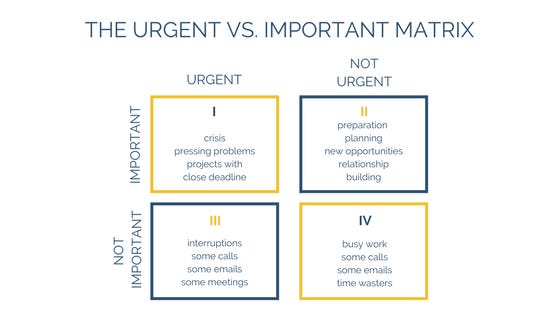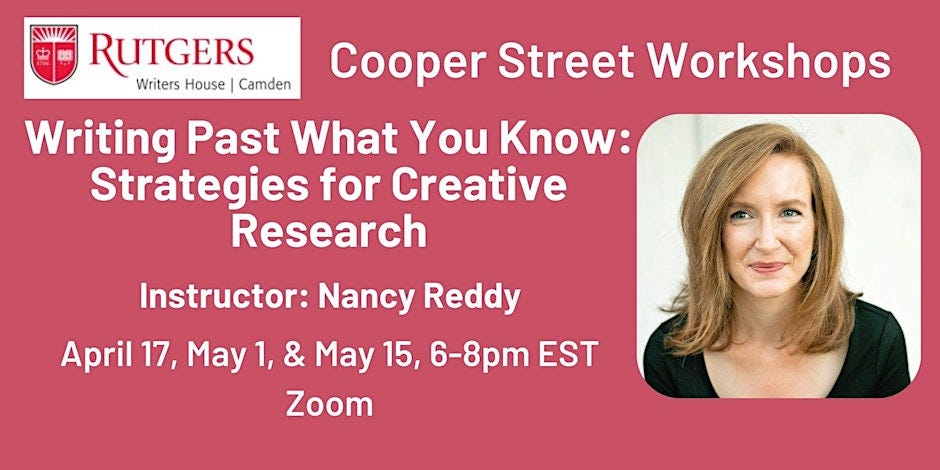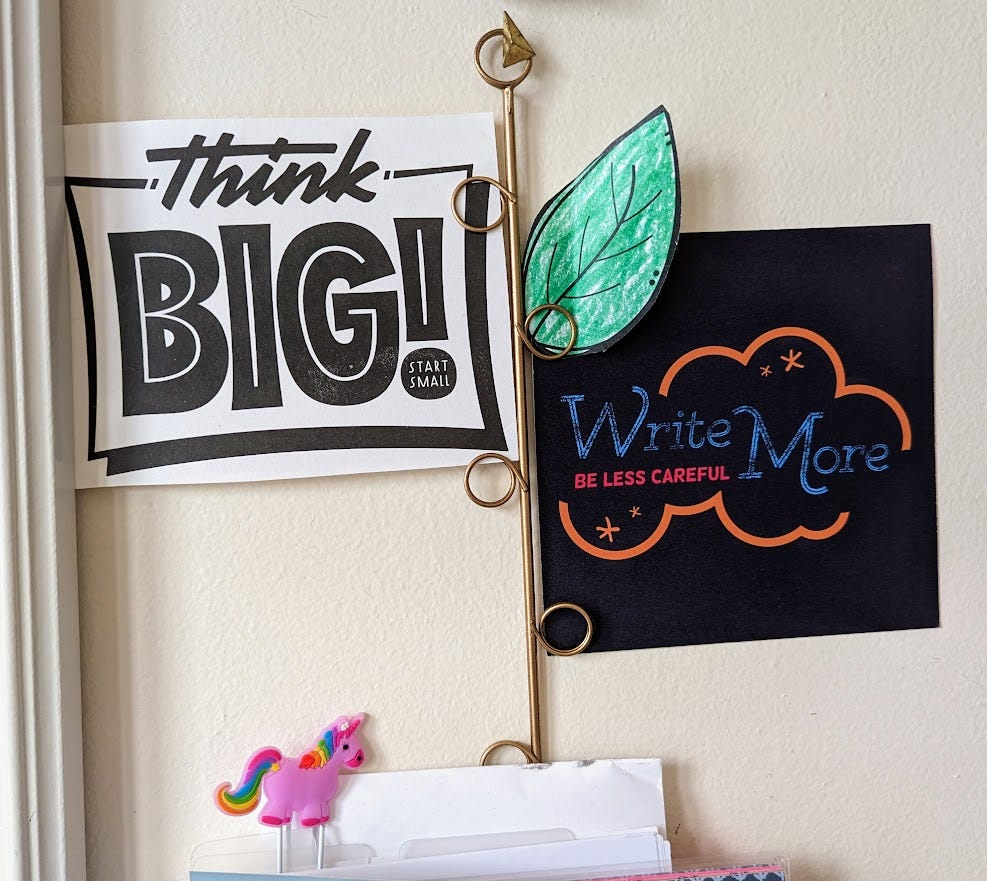

Discover more from Write More, Be Less Careful
how to keep your writing at the top of your to-do list
🎉celebrating three years of writing more together with a little giveaway, plus setting priorities for your writing life in April 🎉
Welcome to Write More! This is the monthly intentions email, which goes out the last Sunday before a new month starts. It’s a chance to pause and set some goals for our writing practice in the coming month. Last month, we talked about how to keep writing when you really, actually don’t have any time to write. This month, we’ll focus on priorities: how to distinguish between what’s urgent and what’s important, how to make your writing feel more urgent, and how to prioritize when you’ve got a bunch of different writing projects underway.
🥳️We’re celebrating three years of Write More with a fun little giveaway, so read to the bottom for details!🥳️
Hi there! Following this great conversation about writing productivity tips, I’ve been thinking a ton about the difference between what’s urgent and what’s important—and how we can use that framework to make sure that our writing doesn’t get perpetually pushed to the side in favor of things like emails, laundry, work projects, and all the other minutiae of life. I can’t remember where I first came across this matrix, often called the Eisenhower Matrix, after something the president may or may not have said, but it feels like a helpful tool for ensuring that writing doesn’t always go by the wayside.
The big picture is this: we tend to prioritize things that are urgent, like projects with firm deadlines or tasks we know we’ll hear about if they don’t get completed, while things that are important but not urgent, like deep revisions on a writing project or drafting a book proposal, are easy to put off. If you don’t grade your students’ essays or answer your boss’s email or get more freezer waffles for your kid, you’re going to hear about it. But if you just let your writing fall to the bottom of you to-do list each week, chances are that no one but you will really know.

(Or, if the Eisenhower matrix is a little too Business School for you, you could always channel the gut punch of this Molly Brodak poem, from her book The Cipher.)
If you’re reading this, your writing is probably very important to you, but it isn’t always urgent. Most likely, no one’s going to call you into their office or complain at the kitchen table if you don’t get around to writing the poem you’ve been meaning to write. But not writing is its own kind of pain. I believe that my writing is just as important as grading my students’ essays and making sure my kids have clean socks and snacks. My writing practice is at the center of my life. And I want that for you, too.
a couple ideas for making your writing urgent, as well as important
external deadlines
The easiest way to get yourself a deadline is to find contests or other submissions windows. (Poets & Writers lists contests of all kinds in its print issues and also has this online database. Electric Literature is opening all its categories to submissions on April 1 and will close when they’ve reached their cap of 750 entries, so start your engines if you’ve had your eye on them!)
If your project doesn’t lend itself to a natural external deadline—say you’re querying agents or doing novel revisions—you can make one. Mark it on your calendar, tell a friend, program your Alexa to remind you, whatever works to make it feel real to you.
accountability
I’ve written a lot about accountability systems here and how for a long time I thought of accountability as finding the right stick to club myself with. I’ve really changed course on that, and the challenge I’d pose now is this: how can you ensure you’ve got at least one person in your life who cares that you’re writing? And you don’t need a regular writing group for this—just a person or two who sees you as a writer and will ask how your work is going.
I’ve talked to so many people lately looking for more community around their writing. Murphy Writing and Blue Stoop both have regular, online, free writing programming; you could easily plug either of those write-ins to your calendar and be on your way to finding other writers.
okay, but what are we actually working on this month?
Another reason that I think writing projects can easily drop down the to-do list is that they can be so squishy. If I’ve got writing blocked on my calendar but don’t make a plan of what exactly I’m working on, it’s a lot easier to fritter that time away answering emails. So I think it’s essential to be really clear on your priorities in your writing life. If you, like me, have a long list of things you could be working on, I’d suggest you spend a little time examining that list and being really rigorous in what you decide is actually your priority right now.
Anything with a deadline or that’s timely in some way could get bumped up to the top of your list. You might also think about what’s going to give you the most satisfaction. If you spend three hours this week diving back in to revisions on a long project, will that give you the spark to keep going? Or, if you need the quick serotonin hit of completing something, you could just pick the thing that’s closest to being done and knock that out. You could also just start with the thing you’re most excited about—or that you’d be most relieved to cross off.
April Intentions
three questions to consider as you set priorities for your writing life this month:
How can you make sure your writing is urgent, as well as important?
What are your priorities for your writing life in the coming month?
What can you do this week that will help you move forward with your writing?
a question for you + a giveaway!
The end of March marks three full years of Write More, and I’d love to celebrate with a little giveaway. I was so thrilled when I shared the very first post, an invitation to write a poem a day in April to celebrate National Poetry Month, and found that within a couple days more than 200 people had signed up! Today, we’ve got nearly 4,000 subscribers, and I’m so grateful you’re all here. I’d love to send you a Write More postcard or sticker—perfect for posting at your writing space or sticking to your notebook. (They were designed by the talented Lindsay Lusby, if you’re in the market for book swag.)
To enter the giveaway, do two things: 1) write a comment below introducing yourself. If you’d like, you can share your priorities for the month, or how you’re making your writing feel urgent. (Nothing makes you feel committed and accountable like writing down your goals where a whole bunch of people can see it!) and 2) fill out this google form with your name and mailing address.
this month in Write More . . .
✨ “you will also learn you are so much more capable of doing many, many things at once than you ever imagined,” a good creatures interview with novelist and podcaster
🧐 I offered tips on using research in creative writing and talked about Alice Winnicott, my favorite of the many wives behind the scientists who shaped our bad ideas about how to be a good mom (the subject of my next book!)
🗨 we chatted about the unbearable bro vibes of most productivity advice and offered tips that actually work
✨ “I wish both mothers and creatives were valued by society,” a good creatures interview with novelist Meredith Jaeger and a conversation about how we insist on the value of our creative work
🌷🌱✍️ let’s write together this spring ✍️🌱🌷
📖 There are still a few spots left in my one-day, in-person workshop on Crafting Vulnerability in Creative Nonfiction, at Murphy Writing’s Writing in the Pines, on April 13 from 9.15am to 4pm. It’s on campus at Stockton, near Atlantic City. There are lots of great options for workshops in memoir, poetry, and fiction. There’s sliding scale tuition —$80-180 will get you a spot in a workshop, coffee/tea, lunch, and a day in really the loveliest community of writers. You can read more and register here.
🔎 There are also a few spots left in this three-session open-genre online workshop, Writing Past What You Know: Strategies for Creative Research, on Wednesday, April 17, May 1, and May 15 from 6-8 pm eastern. It’s $120 for all three sessions, or $30 if you’re a Camden resident or Rutgers-Camden student. (And if you’re thinking, creative research, what is that?! I wrote a post recently about approaches to research in creative writing and how one little question took me down a fascinating new path in my most recent book.) And, as a special treat for newsletter subscribers, you can use this fancy coupon code—WMBLC15—for additional 15% off the cost of the course! You can get all the info and register here.

Write More, Be Less Careful is a newsletter about why writing is hard & how to do it anyway. You can find my books here and read other recent writing here.
If Write More has helped you in your creative life, I’d love it if you would share it with a friend.






















Nancy - good morning. My name is Matthew and I have been on Substack since October. My publication, Beyond the Bookshelf, explores how life and literature intersect. I also do an interview series with other readers/writers to hear their stories related to literature.
I just discovered your publication and am happy to be here. I am retiring from the Navy in June after 24 years. I will be writing full-time starting in the fall. I am currently going through the process of assessing my priorities and figuring out some time management stuff so that my writing floats to the top of the list.
I look forward to engaging with the community here and if anyone is interested in how life and literature intersect I would gladly welcome folks to my publication as well. Getting close to 1k subscribers!
Congratulations on three years!! My writing intentions for April are to read and write poetry. I'd love a postcard for my inspiration wall. Thanks!